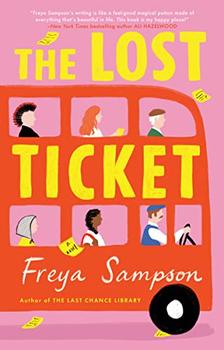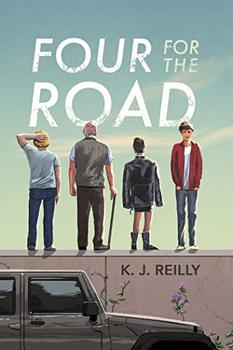Summary | Excerpt | Reviews | Beyond the book | Read-Alikes | Genres & Themes | Author Bio

Drama on the bus can be Shakespearean. You just want to go downtown, but on the way, you overhear a too-loud sob story from someone's phone call, or the guy sitting across from you is impersonating Michael Jackson in a tattered wife beater, or an old lady recites her autobiography to you despite you wearing headphones. However, the bus can also surprise you in ways that aren't just amusing or mildly horrible; sometimes you sit next to someone extraordinary who brightens your day. That is the scenario in which Freya Sampson situates her novel The Lost Ticket. Libby, a woman going through a quarter-life crisis, meets Frank, a stranger with a heartwarming story, on a London bus.
Libby feels like her life is falling apart. She has given up on her artist dreams, and her jerkish boyfriend of half a decade has dumped her, leaving her homeless and jobless, so she has to stay at her unbearable sister's. However, things begin looking up for her when she hears Frank's story. For the past 60 years, Frank has ridden the number 88 bus, hoping to reconnect with a girl he met there in 1962, and Libby vows to help him find her. A quirky commercial take on a coming-of-age story and travel narrative, The Lost Ticket at its core is about trusting one's nonlinear path to happiness and self-acceptance, as well as discovering the true value of kindness. Sampson's novel is a balancing act of humor and heartbreak that makes a cathartic comfort read for anybody who enjoys stories of compassion.
The most compelling part of The Lost Ticket to me is how Sampson writes certain types of characters who are not usually at the center of a fictional narrative. Though the story is mainly told from Libby's perspective, the novel also devotes significant page time to Frank and a woman in her 80s who is at first unnamed. Both of these characters reflect on the remarkable lives they've lived, their current day-to-day experiences, and their troubles as they face the realities of being older. An important theme Sampson explores through these characters is how people may infantilize seniors, and how families may deprioritize quality time with them. Frank becomes exasperated with people treating him like a child. The older woman character feels lonely and distanced from her adult children. I found myself offended on behalf of these characters, and they made me confront my own biases about older people, who are often isolated from the world despite living in it for so long. Sampson makes one question how society devalues people by not considering their multidimensionality, or their humanity, past a certain age. Alongside discussion of diseases associated with aging, this is one of the saddest subjects in the novel, but Sampson tackles both themes with grace by championing these voices and making them vital pieces of the narrative.
I cannot fully discuss my appreciation for The Lost Ticket without touching on its romantic subplot. Libby often keeps her emotions pent up and hidden from the people in her life — her mother, her sister, her ex-boyfriend and even those who become her friends. When her ex, Simon, does something that turns her whole world inside out, the narration encapsulates this tendency succinctly: "There were so many things Libby wanted to say right now, angry, hurtful words she wanted to scream at Simon. But instead she took a deep breath and hung up the phone." No matter how horribly someone treats Libby, she defaults to crying behind closed doors and never confronting them about her anger. Even in moments of happiness, she is cautious, or embarrassed, about letting people know how she feels: "Libby hoped Dylan couldn't sense the joy that was suddenly radiating out of her whole body." But over time, Libby becomes more honest about how she feels and what she wants. She becomes a more authentic version of herself, and this is because she is the foundation of her change. Her kindness toward Frank leads her to meet an odd assortment of people, and eventually a lover. In this way, the romance skirts around Libby's internal conflict instead of "curing" it. This is what made this part of the story especially successful for me, and I greatly enjoyed how Libby complements her love interest rather than appearing dependent.
A public bus is a unique setting, and also, perhaps, a perfect backdrop for Libby's story. She feels pressure to conform to a certain standard, one sculpted by those around her and also by some vague social plane of existence. The only place that relieves her of that pressure is the bus, where she is surrounded by strangers who can only judge her by her appearance. For once, she can be anonymous. When she meets Frank, she does not feel her family's expectations encroaching on her psyche. So, like any stressed person talking to a stranger may do, she overshares, and through this act of sharing, she is liberated. She meets multiple friends through Frank, is able to rebuild her self-confidence, and can finally grow.
Our lives' pathways diverge in the most unexpected places. Sampson reminds readers that it is important to trust the turns that go left when we expect a right. Eventually, we all reach a destination we couldn't have possibly predicted. Somehow, we may end up exactly where we're meant to be.
![]() This review
first ran in the October 5, 2022
issue of BookBrowse Recommends.
This review
first ran in the October 5, 2022
issue of BookBrowse Recommends.

If you liked The Lost Ticket, try these:

The Very Long, Very Strange Life of Isaac Dahl
by Bart Yates
Published 2025
Both sweeping and exquisitely intimate, award-winning author Bart Yates blends historical fact and fiction in a surprising, thought-provoking saga spanning 12 significant days across nearly 100 years in the life of a single man, beginning in 1920s Utah.

by K J. Reilly
Published 2023
The Perks of Being a Wallflower meets The End of the F***ing World in this dark young adult comedy about four unlikely friends dealing with the messy side of grief who embark on a road trip to Graceland.
Your guide toexceptional books
BookBrowse seeks out and recommends the best in contemporary fiction and nonfiction—books that not only engage and entertain but also deepen our understanding of ourselves and the world around us.